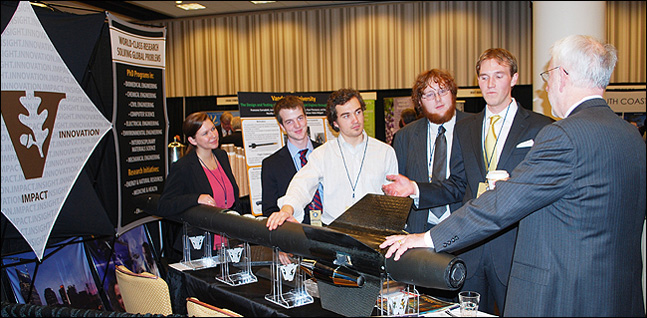
Two Vanderbilt professors were chosen among energy experts from the Southeastern Conference’s 14 universities, industry and government to address renewable energy topics at the inaugural SEC Symposium, “Impact of the Southeast in the World’s Renewable Energy Future” in Atlanta Feb. 10-12. Vanderbilt’s Aerospace Club represented the university in the SEC showcase.
The first-ever symposium is a component of the SEC’s academic consortium of university presidents and chancellors – SECU – which promotes the academic achievements of the league’s universities.
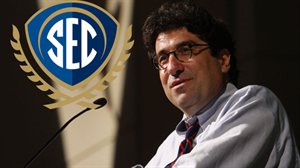
The idea for the inaugural SEC Symposium originated with Vanderbilt Chancellor Nicholas S. Zeppos, who is the current vice president of the SEC Executive Committee and SECU liaison. Zeppos said the league symposium “is an outstanding way to showcase the academic accomplishments and research efforts of our SEC institutions.” (Read: SECU Q&A Vanderbilt Chancellor Nick Zeppos)
“It’s transformative to bring together the best and brightest minds from our member institutions to connect ideas with solutions to provide answers to the fundamental challenges facing our world,” Zeppos said.
Led by the University of Georgia and its Bioenergy Systems Research Institute, the symposium featured a wide variety of presentations from faculty representing each of the 14 SEC institutions, an SEC university showcase, poster exhibitions and a reception with the SEC presidents, chancellors and provosts.
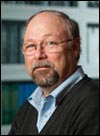
Civil engineering professor Steve Krahn and sociology professor David Hess were session speakers. Krahn was one of four university researchers participating in a session on renewable energy technologies. He joined professors from Alabama, Arkansas and Mississippi. Hess was part of a five–member panel discussion on energy policy and practice. He joined government and industry experts from Oak Ridge National Lab, LanzaTech and Ameresco.
Krahn performs research in the nuclear fuel cycle, risk assessment and systems engineering. Prior to coming to Vanderbilt, Krahn was Deputy Assistant Secretary for Safety and Security in the Department of Energy’s Office of Environmental Management — the largest nuclear program in the United States.
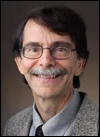
Hess is associate director of the Vanderbilt Institute for Energy and Environment and director of Environmental and Sustainability Studies. His research focuses on the social studies and policy studies of science, technology, health and the environment, with an emphasis on the role of civil society, social movements and public engagement in policy.
While biofuels discussions were at the forefront of the symposium, other sessions addressed the spectrum of renewable energy technologies, including solar, wind, marine and nuclear. Other expert panels discussed energy advances in the transportation sector, advanced materials for energy applications, renewable energy in K-12 education and higher education, and workforce development.
Keynote speakers were Sam Baldwin, chief science officer at the Office of Energy Efficiency and Renewable Energy, U.S. Department of Energy; Steven J. Mirshak, global business director for DuPont Cellulosic Ethanol; and Susanne Shine, ambassador with The Royal Danish Embassy.
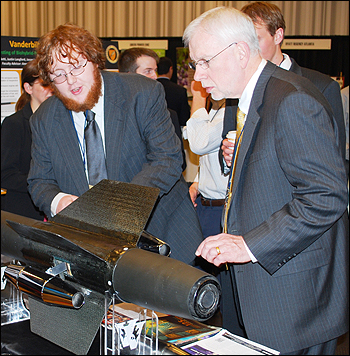
Vanderbilt’s Aerospace Club represented the university in the SEC university showcase. The club displayed its fabricated ramjet engine prototype, designed to burn biohybrid fuel. The engine will be used to power the club’s rocket in NASA’s annual rocketry challenge in April. As part of the SEC Symposium, the showcase consisted of one booth per university designed to display information about renewable energy research, special projects in sustainability or other areas of interest about the university.
“Student participation was a big aspect of the symposium. For Vanderbilt, the Aerospace Club project on the design and flight testing of a biohybrid-fueled ramjet engine came in very handy,” said A.V. Anilkumar, club adviser and mechanical engineering professor of the practice. “Just prior to the symposium, the students finished fabricating the ramjet prototype and were extremely eager to showcase their project,” he said.
“Our students thrive on extreme challenges like instrumenting and test flying a biohybrid-fueled ramjet engine on a ten second rocket flight! Projects like these not only sustain their interest in hands-on engineering, but also provide an exciting angle to the renewable energy challenge,” Anilkumar said.
Both Zeppos and Vanderbilt Provost Richard McCarty spent time with the students who appreciated the administrators’ enthusiasm for their project, Anilkumar said.
“The SEC symposium was a great experience … letting me get a glimpse of the academics and research going on at other SEC schools,” said mechanical engineering senior Dexter Watkins, who served as a Vanderbilt Ambassador for the SEC showcase. “I loved mingling with other students and seeing how each of us is tackling a different aspect of alternative/renewable energy challenges.”
Mechanical engineering senior Francene Corradetti found the symposium helpful. “It was especially beneficial to our project. Since our team has a strong mechanical engineering background, it was great to get feedback from people with chemical and environmental backgrounds.”
Torie Johnson, SECU executive director, said the intent is that the SEC Symposium is a recurring event but that decision rests with the SEC presidents and chancellors.
Read more: SEC Symposium